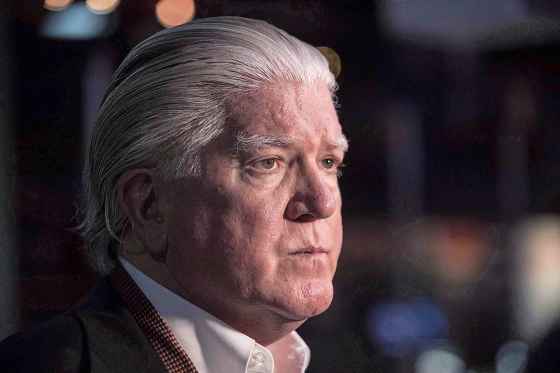The Macro
Go ahead, Eric Staal. Say it loud and proud: I’m a homophobe.
He won’t say that, of course. Nor will his brother Marc Staal or even Ivan Provorov of the Flyers. And really don’t expect it to come out of the mouth of Manitoba-born James Reimer. They’re all too busy enunciating the principled reasons why they have refused to wear a Pride-themed jersey or other equipment in a show of support for the LGBTTQ+ community.

Jordan Staal (front) Marc Staal are busy enunciating the reasons why they have refused to wear a Pride-themed jersey. (Karl B DeBlaker / Associated Press files)
Notwithstanding the tortured logic they are applying to justify their decisions, boycotting an event that is meant to show support for, and condemn prejudice against, LGBTTQ+ athletes is an inherently homophobic gesture.
Before completing my argument in favour of that last thought, some background on the NHL team Pride events.
The history of NHL Pride
Pride Night celebrations hosted by NHL teams started in 2013 when — ironically enough — the Florida Panthers became the first team to host a celebration. That year the NHL partnered with the You Can Play Project, an organization started the previous year by NHL scout Patrick Burke (son of Pittsburgh Penguins president of hockey operations Brian Burke), along with the founders of GForce Sports, an advocacy organization formed by LGBTTQ+ athletes.
The motivation for You Can Play came in part from the death of Brendan Burke, brother of Patrick and son of Brian, who died the previous year in a car wreck. After coming out in 2009, Brendan had been a tireless critic of the culture of homophobia that exists in high-level sports.
By 2021-22, all 32 NHL teams hosted a Pride night in support of the league’s Hockey is for Everyone initiative, which raises money to help make hockey accessible to under-represented groups.

“With the religious reasons, it just doesn’t compute for me,” Brian Burke said. (Chris Young / Canadian Press files)
Why are some players and teams boycotting Pride Night?
The Staals and Reimer directly attributed their decisions to religious, or more specifically, Christian beliefs. That is hardly surprising; there are a variety of Christian denominations that consider the condemnation of same-sex relationships to be a core element of their beliefs.
What is a bit more surprising, and a whole lot more objectionable, is the attempt by these players to claim they are really good and principled people who were almost forced to reach this decision, and as a result, should not be condemned for doing it.
The Staals leaned heavily on that morally perverse bit of logic.
“We carry no judgement on how people choose to live their lives, and believe that all people should be welcome in all aspects of the game of hockey,” the Staals said in a prepared statement. “Having said that, we feel that by us wearing a Pride jersey it goes against our Christian beliefs.”
(It should also be noted that in addition to offering his justification for not wearing the jersey last week, Eric Staal astonished reporters by claiming he had never worn a Pride-themed jersey for any of the six teams he played for. Even when told there is video and photos of him wearing a Pride jersey when he played in Montreal during the 2021-22 season, he denied it.)
Reimer as well has played the “I-won’t-celebrate-Pride-but-I’m-not-a-hater” card. In interviews and a prepared statement, Reimer said despite having “no hate in his heart for anyone,” wearing a Pride jersey “went against what I believe the Bible says.” Even so, he tried to make his decision “as loving and least offensive as possible.”

James Reimer said he tried to make his decision “as loving and least offensive as possible.” (Darryl Dyck / Canadian Press files)
How have people reacted
The teams, head coaches and others within the NHL community have tried to be deferential about these decisions, although some coaches have expressed their “disappointment.” Some entire teams — the New York Rangers, Chicago Blackhawks and Minnesota Wild — all cancelled Pride Night citing a variety of concerns, including repercussions for Russian-born players whose family could be threatened by new Russian laws that make same-sex activity criminal.
The best and most important reaction came from the aforementioned Brian Burke, who has actively promoted LGBTTQ+ rights — in hockey and in society — as a way of paying tribute to his late son, Brendan. In a moving interview last weekend on Sportsnet, Burke eloquently and respectfully laid waste to the Staal-Reimer arguments and demonstrated unwavering support for the cause behind Pride Night.
“With the religious reasons, it just doesn’t compute for me,” Burke said. “I was born and raised a Catholic. I don’t see any conflict between my religious beliefs and the ability to say to the LGBTTQ+ community you’re welcome here. It’s about saying this community is valuable and important and we want to honor them.”
The essence of homophobia is the insistence on condemning a LGBTTQ+ lifestyle as immoral, unnatural and unacceptable for whatever reason. The Staals and Reimer may not know this, but homophobia does not become more acceptable in a religious context. Hate is hate, even if you try to justify it with a quote from Leviticus.
At a time when Uganda and Russia are making it criminal to engage in same-sex relationships, and various American states are passing laws making it illegal to even discuss same-sex relationships in schools or libraries, the actions of this handful of NHL players are enormously disappointing.
If you really want to be as loving and respectful as possible, then start by demonstrating unconditional love and respect. Anything less than that doesn’t qualify.
|

